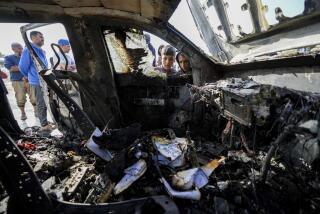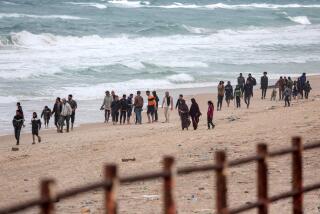Egypt military says soldiers didn’t intentionally kill Copts
- Share via
Reporting from Cairo — In an attempt to stem widening criticism of their grip on power, generals in Egypt’s ruling Supreme Council of the Armed Forces said Wednesday that soldiers were attacked by mobs and did not intentionally kill Coptic Christian protesters this week.
The generals’ comments at a news conference were the first public statements by the military on the incidents Sunday, when clashes between thousands of Christian demonstrators, thugs and military police left 22 Coptic protesters and three police officers dead and more than 300 people injured.
The Copts were protesting the burning of a church by Muslim radicals in southern Egypt.
“Members of the military police did not fire live ammunition,” Gen. Mahmoud Hegazi said in a clear attempt to defuse the anger of Christians and Muslims over the military’s crackdown on the protest and its refusal to quickly turn the country over to civilian rule.
To support its version of events, which starkly contrasted with video posted by activists and protesters, the military aired video of the clashes taken by state TV and independent Egyptian media. State TV also reported Wednesday that the three soldiers killed during the protests had been buried in private ceremonies.
Gen. Adel Emara said soldiers were armed only with riot gear and blank cartridges. He said the protest outside the state Radio and Television Building in downtown Cairo started peacefully before protesters’ numbers swelled to 6,000, including men “carrying swords, gas cylinders and Molotov cocktails” who attacked soldiers. He also pointed to videos suggesting that priests urged protesters to storm the building.
“I’m not saying who had what, whether it was a thug, an infiltrator or anyone joining the protest, but this is the truth,” Emara said.
The generals’ comments, however, did not answer many questions. Activists and human rights groups have criticizing SCAF, the military council, for not protecting protesters who were seen in YouTube and Facebook videos being shot at and run over by armored personnel carriers. Forensic reports confirmed that some of the those killed had been crushed and struck by bullets.
“What was presented by SCAF today can show that SCAF is at least trying to create bridges and interact with Egyptians. But if we talk about evidences and proofs, I don’t think that it will change the way activists and politicians feel towards the military,” said Ammar Ali Hassan, an analyst at the Center for Middle East Studies in Cairo.
Emara said some soldiers may have accidentally run over protesters while encountering an “unprecedented psychological state” and trying to escape demonstrators’ assaults. “I can’t deny that some people may have been hit, but it was not systematic,” he said.
The generals hinted at the possibility that “foreign hands” attempted to exploit the protests to ignite sectarian divisions and disrupt Egypt’s security after the winter uprising that toppled President Hosni Mubarak. Copts make up 10% of Egypt’s population of more than 80 million.
The violence has shaken the military-backed interim government, which at times has appeared to make contradictory statements. On Tuesday, Finance Minister Hazem Beblawi resigned from his post in protest of the killing of demonstrators. But on Wednesday, Beblawi announced that he had withdrawn his resignation because he feared his departure would further damage the country’s tumbling economy and struggling tourism industry.
In another attempt to calm the nation, Field Marshal Mohamed Hussein Tantawi, the head of the military council, has ordered an official investigation of the incidents and urged the Cabinet of Prime Minister Essam Sharaf to pass a law to better protect the construction of churches and other houses of worship.
Hassan is a news assistant in The Times’ Cairo bureau. Times staff writer Jeffrey Fleishman contributed to this report.
More to Read
Sign up for Essential California
The most important California stories and recommendations in your inbox every morning.
You may occasionally receive promotional content from the Los Angeles Times.












